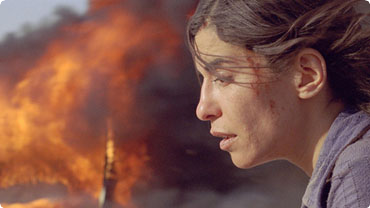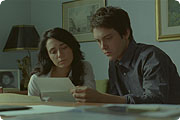 Twin brother and sister Simon and Jeanne live in Quebec, Canada when their mother Nawal suddenly dies. From their mother’s will, the two children learn that not only is their father that they until now believed to be dead is alive somewhere on the earth, but also that they have an older brother. Nawal entrusted her lawyer with two sealed letters and asks her two children in her will to track down their father and older brother in order to deliver these letters to them. Jeanne sets out to the Middle East, Nawal’s birthplace, to carry out her mother’s final wish and search for the hidden past of her mother. This land seems to be Lebanon, although the movie does not specify the country. Are her father and older brother still alive? If so, where and what kind of life are they living?
Twin brother and sister Simon and Jeanne live in Quebec, Canada when their mother Nawal suddenly dies. From their mother’s will, the two children learn that not only is their father that they until now believed to be dead is alive somewhere on the earth, but also that they have an older brother. Nawal entrusted her lawyer with two sealed letters and asks her two children in her will to track down their father and older brother in order to deliver these letters to them. Jeanne sets out to the Middle East, Nawal’s birthplace, to carry out her mother’s final wish and search for the hidden past of her mother. This land seems to be Lebanon, although the movie does not specify the country. Are her father and older brother still alive? If so, where and what kind of life are they living?
 In short, this is a mystery solving movie, but it gives the impression that this story was created based on facts and is close to reality or even possibly based on the author’s personal experience because of the Lebanon-like scenery and the violent confrontation between Christians and Muslims killing each other which actually happened in Lebanon’s history. However, as this story develops and goes from being simply a sad story to being an improbably terrifying story, I feel, “Come on, this shouldn’t be a Greek tragedy,” and have lost interest by the end of the movie. It would be really terrible if this story was true. In fact, I think many viewers are overwhelmed by the terror of this movie.
In short, this is a mystery solving movie, but it gives the impression that this story was created based on facts and is close to reality or even possibly based on the author’s personal experience because of the Lebanon-like scenery and the violent confrontation between Christians and Muslims killing each other which actually happened in Lebanon’s history. However, as this story develops and goes from being simply a sad story to being an improbably terrifying story, I feel, “Come on, this shouldn’t be a Greek tragedy,” and have lost interest by the end of the movie. It would be really terrible if this story was true. In fact, I think many viewers are overwhelmed by the terror of this movie.
However, when you think about this movie calmly, many things don’t make sense and bring up many questions. To name a few… The mother and older brother are too close in age. Also, since the mother suddenly loses consciousness one day and soon dies without regaining consciousness, it is not likely there was time to contrive this mystery left behind in her will. The mother falls into situations during the civil war where she could have died many times, yet she mysteriously survives while countless people around her die one after another. Furthermore, there are too many miraculous accidental encounters that can’t possibly happen, and people remember the mother and older brother well, even though it was thirty years ago. The unconscious mother in the hospital, who fell into a coma when she learned a shocking truth, somehow seems to have enough intellectual control to write the elaborate letters given to her children. Because of these inconsistencies, the movie itself feels like it’s all a lie. Even though this movie depicts deep human tragedy, it is not believable.
After watching this movie, I learned that this movie was Denis Villeneuve’s movie adaptation of the play written by Wajdi Mouawad and finally understood. Wajdi Mouawad left Lebanon to avoid the Lebanese Civil War and immigrated to Canada in 1983 when he was 15 years old. Because he was Lebanese and knew what happened in Lebanon, this play is set in a Lebanon-like Middle East country, but the intention of the play was not, “I want to convey the tragedy of the Lebanese Civil War.”
I think the movie adaptation happened because the play was very powerful, but the original work inevitably becomes something different whenever a play is adapted to a movie. The play expresses an abstract concept by borrowing the Middle East as a stage, but, because the movie takes a very realistic approach, the movie gives an impression that it is based on what actually happened and that there is a political opinion and agenda. Of course Wajdi Mouawad who had to leave his homeland may have some kind of political agenda, but he probably wrote this play out of his ambition as an artist to carry on the tradition of Greek tragedy and to be some form of a modern Shakespeare. Or possibly he wanted to present the question of, “Who is this ‘God’ that causes Muslims and Christians who live amongst each other to kill each other?” At any rate, his goal seems to be to play an intellectual game in the Middle East, rather than communicate the truth. The answer to this game was the stylish formula “1+1=1.”
Surely “the arts” are “artificial” and the stage and movie are certainly “artificial,” but there is a subtle difference between the two. For a person watching a play, a trivial discrepancy between facts is not a problem if there is a powerful theme. The audience doesn’t demand “realism” because there are too many limitations on a stage to present reality, but the audience often demands “realism” from a movie. Certain plays are smoothly adapted to movies and the audience doesn’t have the feeling that something is not right. However, because this movie uses too much of a documentary touch and has an impression that it is based on reality, the audience cannot immediately understand it as a magnificent Greek tragedy. Anyway, even if they don’t understand it, many viewers seem to be overwhelmed by the powerfulness of the movie and are emotionally moved.
